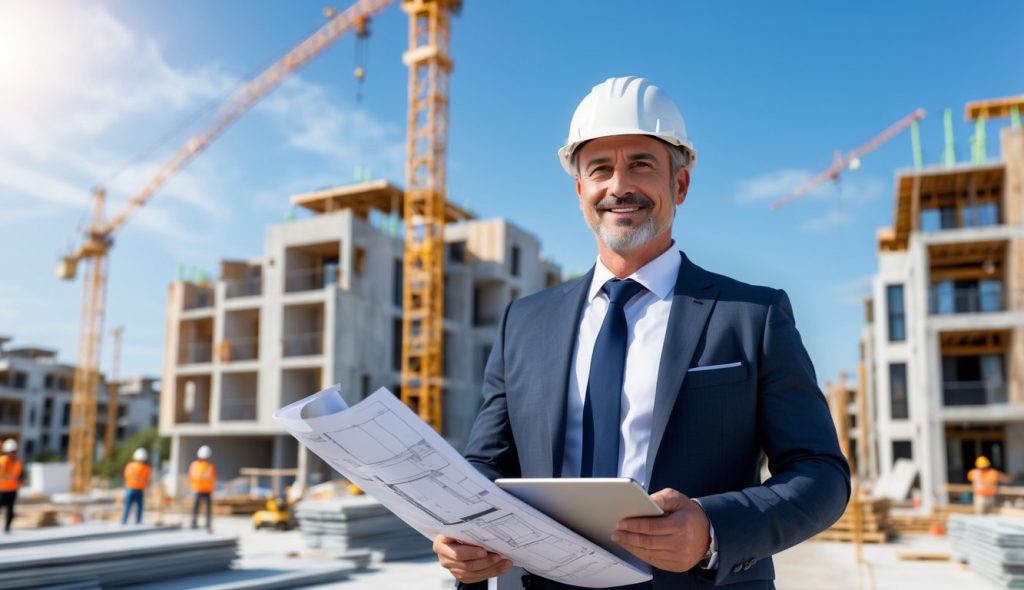How To Check Out a Real Estate Developer

When you invest in a new property, your decision isn’t just about the building—you’re also placing trust in the real estate developer behind it. Thoroughly checking out a real estate developer is one of the most important steps before making any investment commitment. A few smart moves up front can save you from costly regrets.
Verify the developer’s licensing, review their track record, and evaluate past projects for quality and reliability. You can research a developer’s reputation and credibility by checking regulatory registrations, examining customer reviews, and conducting background checks. Knowing the best practices and warning signs will give you confidence as you move forward with your investment.
Key Takeaways
- Always verify developer credentials and past work.
- Watch for red flags and do detailed research.
- Being thorough now protects your property investment.
How to Check Out a Real Estate Developer
When you invest in a new real estate property, choosing the right developer is crucial. Take the right steps to verify legitimacy, review track record, understand legal matters, and assess developer transparency to minimize risk and increase your chances of satisfaction.
Verifying Developer Legitimacy
Start by confirming the developer’s business credentials and state licensing. Many U.S. states require real estate developers to register with local regulatory bodies such as the Department of Real Estate. Search these public registries to confirm if a developer is officially licensed and operates legally in your state.
Ask to see a copy of the developer’s license or registration, and verify the registration number with the regulatory body’s online portal. Check legal status through the Secretary of State’s business entity search in your state. This ensures the developer operates with permission and is not on watchlists or subject to restrictions. Learn how to verify a real estate developer’s legitimacy by following a clear set of steps.
Evaluating Track Record and Reputation
Assess a developer’s project history to gain insights into their experience and reliability. Research completed projects and check if they delivered on time, within budget, and as promised. Online real estate forums and discussion boards offer valuable tools, with buyers sharing firsthand experiences and reviews of different property developers.
Use property portals like StreetEasy or local real estate directories to see previous projects’ sales records and market performance. Contact real estate agents who have worked with the same developer for more details. Reliable developers typically remain open about their completed and ongoing projects. Investigate further and explore a developer’s reputation and credibility through forum insights and market feedback.
Identifying and Avoiding Legal Issues
Conduct thorough due diligence before you commit financially. Review legal documents for the project, including title deeds, permits, and local authority approvals, to ensure the property complies with zoning and building codes. Hire a real estate attorney to validate paperwork and spot issues in contracts that may create legal or financial risks.
Check government agencies for complaints or legal actions against the developer, and request evidence of resolved issues on previous projects. Researching legal history helps you avoid incomplete developments, ownership disputes, or future litigation. Consider tips on checking a developer’s legality to minimize exposure to legal complications.
Customer Satisfaction and Transparency
Direct feedback from previous buyers offers one of the best ways to evaluate developer trustworthiness. Look for consistent positive or negative themes in online reviews, social media, and buyer forums. Ask for customer references and contact them to discuss their real-world experiences about build quality, delivery timelines, and after-sales support.
Transparency is another key marker—legitimate developers provide detailed documentation, regular project updates, and clear answers to your questions. Treat an absence of clear communication or reluctance to offer references as a warning sign. Learn more about background checks on real estate developers to better inform your decisions as an investor.
Key Factors to Consider Before Investing with a Real Estate Developer
Careful due diligence on a real estate developer reduces risk and helps you invest with more confidence. Understanding the developer’s process, financing, risk management, and market position directly impacts your investment decision.
Understanding the Development Process
Examine how the developer manages the construction and design stages, including their relationships with architects and contractors. Strong project management is crucial for timely delivery and quality standards. Ask for a detailed timeline breaking down each development milestone from land acquisition to final handover.
Request documentation related to permits, design plans, and environmental clearances. Consider the developer’s history of delivering projects on schedule and within scope. If a developer routinely finishes late or changes specifications without notice, treat that as a red flag. Transparent documentation demonstrates reliability and experience in real estate development.
Financing and Investment Opportunities
Scrutinize how the developer funds their projects and what options exist for investor participation. Strong financial backing reduces the risk of cash flow problems during construction. Review the structure of investment offers—whether through direct purchase, joint ventures, or pre-sales.
Look for clarity on financing sources and whether the developer uses a mix of equity, debt, or customer advances. Seek information on the return on investment, minimum investment thresholds, and expected timelines for profits. Developers with transparent financing practices signal accountability and informed risk management. Several guides suggest that assessing financial stability is a crucial step in evaluating a developer’s reliability.
Assessing Project Delays and Risks
Check the developer’s record for project delays, missed deadlines, or outstanding litigation. Regular delays can cost you both time and potential returns. Ask for a summary of any past projects that experienced overruns and how the developer managed or compensated for these issues.
Pay attention to how the developer addresses common risks such as labor shortages or supply chain issues. Reputable developers have contingency plans and openly communicate with investors about risk mitigation. If a developer cannot provide this information or is evasive, reconsider your options. Detailed risk assessment practices can help you avoid costly mistakes.
Analyzing Market Trends and Zoning Regulations
Analyze current market conditions before committing capital to any real estate development. Understanding demand, area appreciation potential, and recent transaction data helps you gauge if the location is sound for investment. Use local real estate reports to identify trends.
Review how the developer navigates zoning regulations and building codes. Projects in areas with uncertain zoning are more likely to face delays or even cancellation. Examine any history the developer has dealing with local authorities, zoning approvals, and compliance. This research will inform you whether the developer consistently follows legal standards and positions projects for long-term value, as emphasized in various expert guidelines.
Frequently Asked Questions
When evaluating a real estate developer, you need to understand how developers enter the industry, the steps they follow, their main responsibilities, licensing requirements, compensation structures, and potential earnings. This context will help you ask the right questions and spot red flags during your due diligence.
How can you become a real estate developer without any experience?
You can start in real estate development by gaining practical exposure through related fields like construction, real estate sales, or property management. Many developers begin as investors, learn from mentors, or partner with more experienced professionals. Building a network and understanding the local market are key steps to bridging the gap without prior experience.
What are the essential steps to becoming a real estate developer?
Typical steps include researching the target market, securing funding, acquiring suitable land or property, and managing the project from zoning approvals to final sale or leasing. You need to coordinate with architects, planners, and contractors, and maintain compliance with all relevant regulations. Following a proven process is critical to manage risks and improve outcomes.
What are the typical responsibilities of a real estate developer?
A real estate developer identifies viable opportunities, conducts feasibility analysis, oversees due diligence, and acquires land. Developers coordinate with architects, engineers, contractors, and local authorities to move projects forward. They also manage budgets, timelines, marketing efforts, and final sales or leasing activities. Find more about these core duties on this comprehensive real estate FAQ.
Is a license required to practice as a real estate developer?
In most regions, you do not need a specific developer license. However, you often need licenses for related activities like real estate brokerage or general contracting. Verify your local regulatory requirements. Ensure the developer you are checking out is properly registered and compliant with all essential business laws.
What is the expected salary range for a real estate developer?
Salaries for real estate developers vary significantly based on location, experience, and the scale of projects managed. Entry-level positions may offer lower compensation, while established professionals managing large projects can earn substantial incomes. According to industry averages, annual salaries typically range from mid five-figures to well into six figures depending on success and market conditions.
How do real estate developers structure their fees and earnings?
Developers usually earn income through a combination of development fees, project profits, and equity participation. Project size, complexity, and risk factors often determine fee structures. Review the specifics of any compensation arrangements to identify potential conflicts of interest or misaligned incentives. For suggested questions to ask a developer about fees, see this guide to real estate developer FAQs.
Ever wish you could analyze properties like the pros?
Save time and make smarter investment decisions with the most powerful real estate analysis software on the market.
Enter the code BESTDEAL at check out and receive a 20% Off Discount!

Dive deep into the world of real estate investment with this comprehensive case study that brings theory to life.
Investment Real Estate Analysis: A Case Study offers an unparalleled look at the decision-making process behind successful property investments. Follow along as we dissect a real-world scenario, revealing the critical factors that seasoned investors consider before making a move.
From crunching numbers to assessing market conditions, this book walks you through every step of the analysis process. Learn how to evaluate potential investments like a pro, understanding key metrics such as cap rates, cash-on-cash returns, and internal rate of return.
Whether you’re a novice investor or looking to refine your skills, this case study will equip you with the tools to make informed investment decisions in the competitive real estate market.
Get your copy now from your favorite bookseller:
- Amazon
- Books2Read for Apple, Barnes & Noble, Kobo, Scribed, and 8 more sellers with both eBook and paperback options available
- Payhip as a downloadable PDF
Ready to take your business to the next level?
- Subscribe to our newsletter
- Visit the learning center
- Learn more about our consulting services
